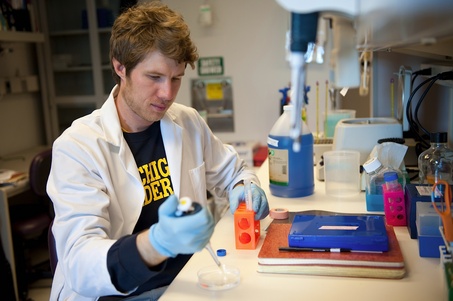The University Research Track, now in its third year at the Michigan Growth Capital Symposium, showcased promising research projects and spinout companies emerging from seven leading Midwestern research universities. This year’s cohort included three newcomers ─ Medical College of Wisconsin, Purdue Research Foundation and Wayne State University ─ along with four returning schools ─ Notre Dame, University of Minnesota, Michigan State University and the University of Michigan.
 Technology-transfer and commercialization officials from each participating university outlined the research facilities, spending and sector focus at their respective institutions. They also highlighted innovative spinouts that have licensed intellectual property originating at their schools. “There are real bargains in the Midwest,” remarked Dan Hasler, president of the Purdue Research Foundation. He said corporations and venture capitalists visit Purdue’s Discovery Park, a 40-acre interdisciplinary and multidisciplinary research park located in the West Lafayette campus, to scope out research for commercialization and investment.
Technology-transfer and commercialization officials from each participating university outlined the research facilities, spending and sector focus at their respective institutions. They also highlighted innovative spinouts that have licensed intellectual property originating at their schools. “There are real bargains in the Midwest,” remarked Dan Hasler, president of the Purdue Research Foundation. He said corporations and venture capitalists visit Purdue’s Discovery Park, a 40-acre interdisciplinary and multidisciplinary research park located in the West Lafayette campus, to scope out research for commercialization and investment.
“Smart money invests in our innovations,” stated Kalpa Vithalani, licensing manager at Medical College of Wisconsin. “We have promising early-stage companies and success stories.” As an example, Gen-Probe (Nasdaq: GPRO) acquired Medical College spinout company Prodesse Inc., a leader in molecular testing for influenza and other infectious diseases, for approximately $60 million in cash in October 2009. In January last year, Roche disclosed it was paying up to $625 million for non-invasive prenatal testing firm Ariosa Diagnostics, another Wisconsin spinout. “Our goal is to advance community health through innovation,” Vithalani added. “We want to turn IP into useful products.”
Gaylene Anderson, senior innovations officer at Notre Dame, predicted nanomedicine will be the next hot biotech market, with sales expected to triple in five years. “We use a service-based business model,” she explained. “Our go-to-market strategy is to target a big pharma with toxicity issues or patent expirations.” For example, Notre Dame spinout Certus, which offers a nanoparticle drug delivery platform known as Lypos, will do the bioengineering and give formulations to another company to take to market.
The University of Michigan spun out 19 startups in 2015 and is on track to do 12 this year, reported Jack Miner, director of the U-M Venture Center. Among the standouts are RPNI, a team developing nerve interface to give amputees fine motor control of prosthetic upper limbs, and Xondas, which is developing a way to charge batteries remotely in implantable devices.
To learn more about MGCS visit www.Michigan-GCS.com. Follow conversations surrounding the symposium through #MGCS2016 on Twitter.
